Indistylemen
How to Wear Pink in Menswear
- Get link
- X
- Other Apps
Thanks to corporate marketing initiatives in the mid-20th century, pink is entrenched in the minds of most Americans as a distinctly feminine color. So how can men best wear it?
Blue is for boys and pink is for girls is a common perception around the globe. However, pink is a supremely versatile color and should receive more play in the masculine wardrobe. In this article from our series on wearing different colors in menswear, we’ll discuss the history of pink in menswear, and when, where, what and how to wear pink successfully.
A Brief History of Pink in Men’s Fashion
For a long time in the history of the West, pink was not associated with one particular sex or gender. Opinions on whether to dress a newborn in blue, pink or some other color varied by region or country. However, coding by color began to take hold in the mid-20th century when American companies began marketing pink items for girl children and blue for boys.

Until the last century, pink was also a color associated with male children, like the boy above, who also wore dress-like garments until they reached a certain age.
Within a few decades, the equivalence of pink with women was established, so that even now, articles on pink for men are always bound up with considerations of gender. Sure, during “Pinktober” men in the US, including players from the National Football League, that most macho of sports, wear a lot of pink to spread breast cancer awareness. Perhaps not coincidentally, this is followed by “Movember,” which re-establishes masculinity by promoting the growth of facial hair for the whole month! Indeed, men’s brands often market pink items variously as red, crimson, and other names rather than calling them pink for fear that they won’t sell otherwise.
Meanwhile, The Independent proclaims that “menswear is borrowing from the girls” in its use of pink while an article in The Telegraph asks “Are you man enough to wear pink?” Inevitably these articles tout that you are actually more manly if you wear pink because it shows you are secure enough in your masculinity to do so. A recent scientific study also shows that women actually do prefer pink but because of this, they also love men who wear pink and find them more attractive. Whatever makes you feel confident wearing it, I guess, though for me, choosing pink is, first of all, an aesthetic decision: it simply looks good with certain colors.
In any case, gender associations surrounding pink exist mainly in North America. In India, men wear pink all the time. In the UK, you’re likely to see pink shirts more widely represented with suits and ties among bankers and other businessmen. There, men who wear pink area have been found to earn £1000 more a year than those who don’t.
How to Wear Pink
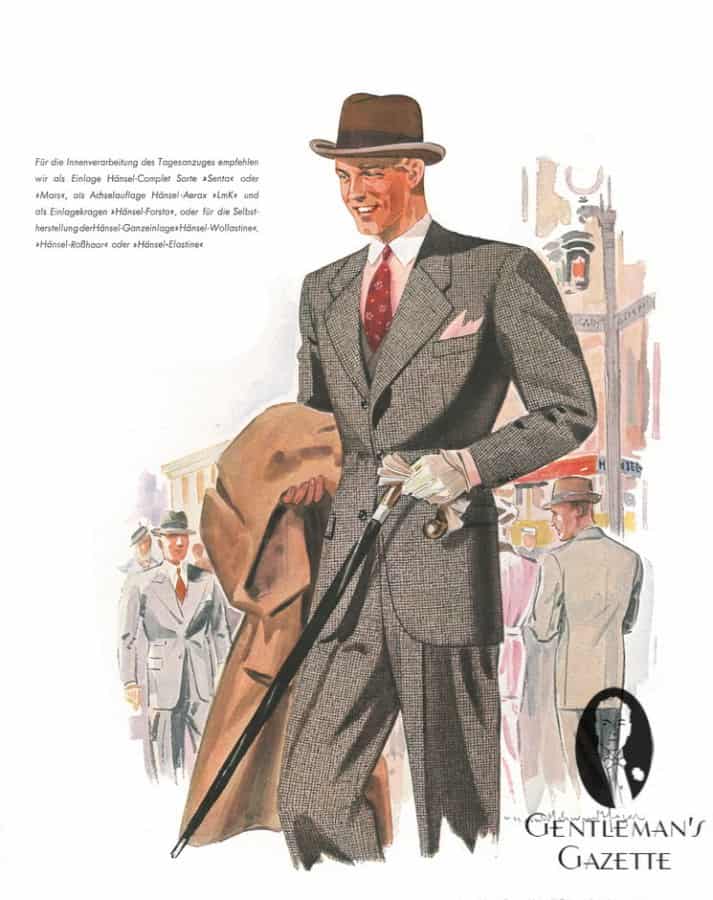
An elegant fall or winter combination composed of a gray notched-lapel suit, a pink Winchester shirt, a pink pocket square, and beige gloves.
When Can You Wear Pink?
While pink may first be associated with the brighter color palette of spring and summer, it is a wonderful year-round color if you choose the most complementary shade for the season and your outfit.
Bright shades of pink are ideal for spring and summer, while muted shades of pink can be worn year round. In the warmer seasons, you can experiment with wearing pink as the dominant shade in your outfits, such as a pink blazer or pants, while in winter, pink makes for an interesting color for a shirt or an accessory, such as socks.
Which Tone of Pink Should You Wear?
In terms of the color spectrum, pink is a very interesting color. According to science, it technically doesn’t exist, because if we look at a rainbow or light refracted from a prism, there is no pink visible in it. Red is the first color in the rainbow and violet the last–remember ROYGBIV? Pink occupies the blank space between red and violet, which includes all the light waves we can’t see (infrared, ultraviolet), so our eyes invent pink to fill in that gap. In a simple practical sense, however, the color we see as pink is created by mixing red and white. Still, it can be dark or light and either tend toward peach (if it contains undertones of yellow) or fuchsia/mauve (if it contains more blue or purple).
Generally, for men (and, I would argue, for anyone), lighter pinks are preferable in either tone (the first three colors on the bottom left of the image above). Brighter pinks are loud and dominate an outfit. Assessing where a pink item of clothing lies along the range of tones is important if you plan to coordinate with a second pink or even with other colors; for example, a pocket square that contains a salmon pink will not go well with a tie that is peach pink, and some variants of pink may look better with particular blues while others may make blue look more purple.
For those who are resistant to wearing pink or who want to be creative in creating the color, try a pattern that contains red and white, like a white shirt with thin red stripes or a red and white herringbone tie. When these two colors appear side by side in a tight pattern, they will read to the eye as pink.
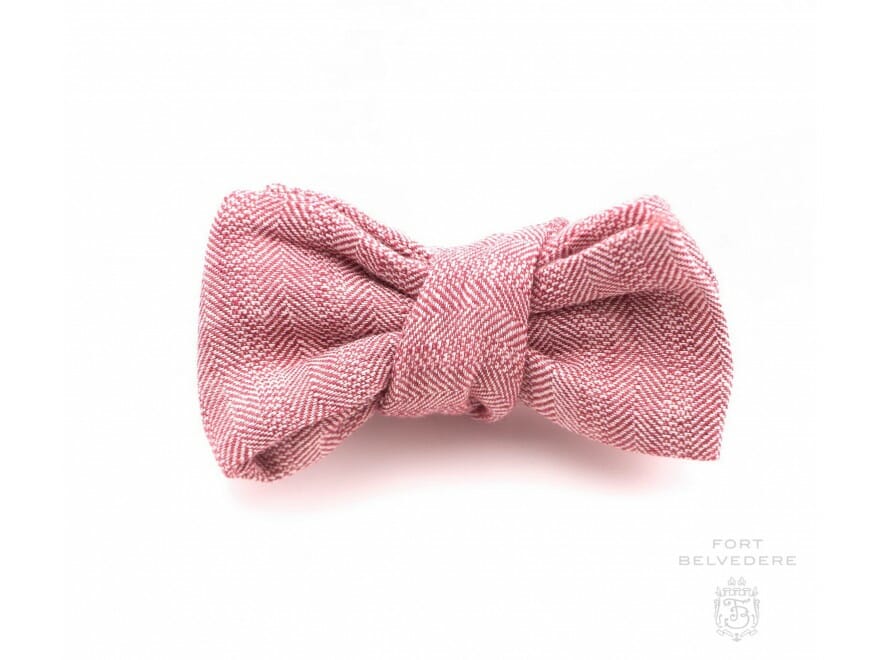
Depending on how it’s combined, this Herringbone Wool Red and Off-White Bow Tie by Fort Belvedere can read as pink or muted red
Ultimately, the choice of which pink to choose depends on your complexion if you are getting a shirt or sport coat, as these articles of clothing place the color in proximity to your face. If you have brown skin, most pinks will work for you. If you have a lighter complexion, pink still looks best if you have a tan. Fortunately, pink is most suitable as a warm weather color because of its brightness, so you can work on tanning beforehand. If you aren’t tan, a large stretch of pink near your face will bring out any pink spots or blotches and emphasize them more.
Pairing Pink with Other Colors
Pink is a great choice because it pairs well with all the major menswear colors–namely gray, blue, and brown–and then some. Pink and gray–from light gray to charcoal–are ready companions, such as in the form of a pink tie with a gray suit. If you have gray hair, pink will also be your friend, perhaps as a pink shirt. In the shoulder season between winter and spring or summer and fall, pink can succeed with burgundy or maroon. Combining these cool weather hues with pink makes for an apt transition between seasons.
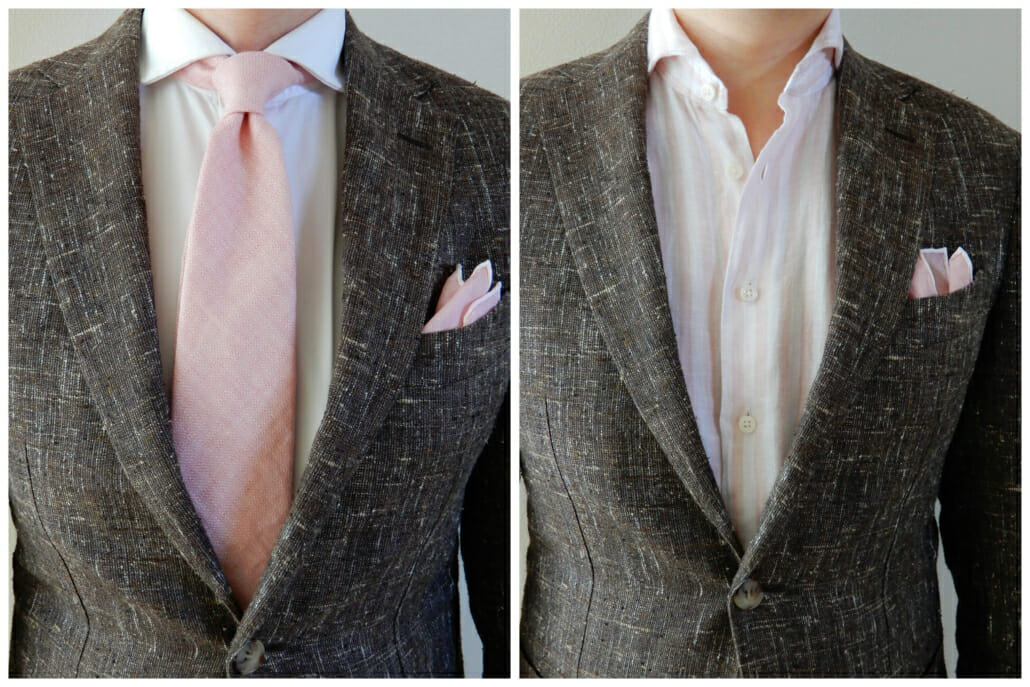
The author in two simple pairings of subtle pink with brown: a pink linen tie and a pink cotton pocket square with white border; pink linen striped shirt.
My personal favorite color to wear with pink is brown. A pink summer tie with a brown linen jacket is a terrific choice. Pink and blue also feature together frequently but need a little more caution.
Especially when it is worn with mid-blue rather than navy, pink can make the blue appear more indigo or violet, shifting it toward the purple part of the color spectrum. This isn’t necessarily bad, but be aware of the interaction.
A bold pairing that isn’t seen that often is pink and green, which are complementary on the color wheel, though an abundance of caution is needed lest you end up looking like the Joker as played by Caesar Romero. As usual, moderation is the key. Try olive green and a light pink instead of neon.

Gianni Fontana’s choice of olive green and pink is a winning combination, though one plaid is enough in any given combination
Lastly, in summer, pink and white are a winning combination; after all, pink is made with red and white, and that white undertone can bring together a pair of white pants and a pink shirt.
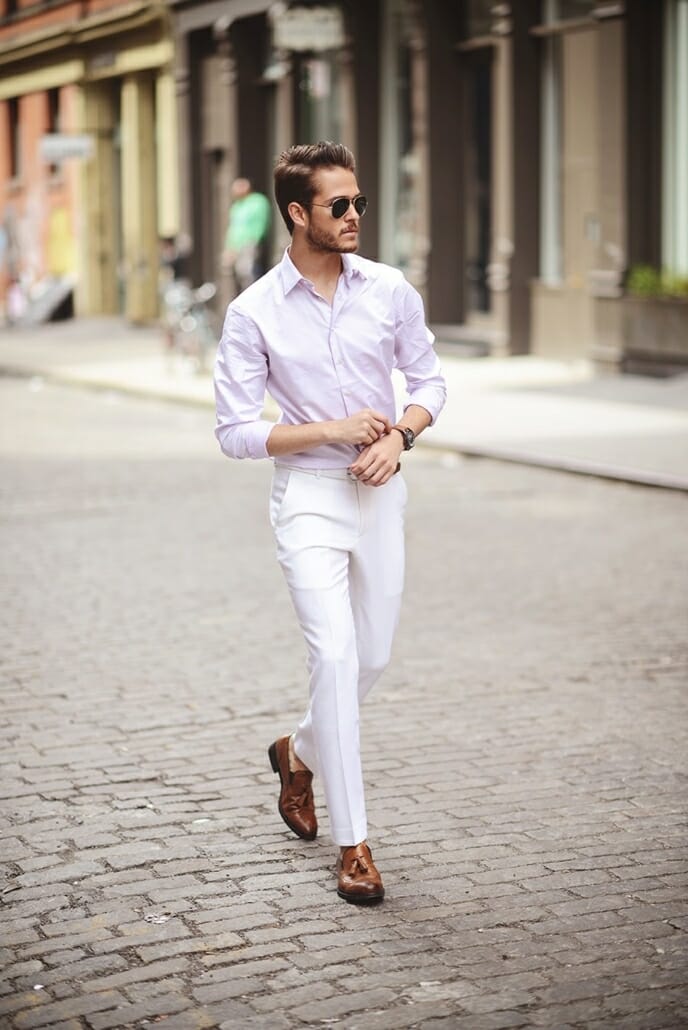
IAmGalla pairing a subtle pink shirt with white pants for a summery look
What to Wear in Pink
Pink Shirts
The easiest way to add pink to your wardrobe would be a shirt. Make it fairly light; that way you get enough of the color to make an impression but not to overwhelm. The history of the pink shirt as part of classic style is, admittedly, a short one, as is the history of any colored shirt or any shirt with a pattern for that matter. Originally, all shirts used with tailoring were white (or off-white, depending on how bad your washing was). Stripes were originally shunned for their association with the lower classes, sin, and the Devil then maintained negative class connotations for some time. Colored shirts, similarly, were associated with manual labor (thus, the term “blue-collar workers” based on the denim or chambray shirts they wore). So, no gentleman would wear anything other than a solid white shirt. However, as norms of dress relaxed or were defied, colored shirts began to creep in.
Sources usually credit Brooks Brothers for introducing pink dress shirt for men in the early 1900s, but it only took off in the post-War ’40s as part of a burgeoning defiance of norms and part of the Ivy-style movement. Consider wearing it under a sports coat or suit jacket, which tames the color and minimizes the interplay of the color with your skin tone. With a polo shirt, on the other hand, the color is your “top layer” and the pink has a more potent impact–it can dominate as the focus of attention and also clash more with some skin tomes unless you wear a polo with a jacket (not usually recommended). With that said, you have more leeway for bright colors in warm weather, so a light pink polo in the heat of summer is still a possibility, but start out with pink long-sleeved shirts under a jacket.
Pink Accessories
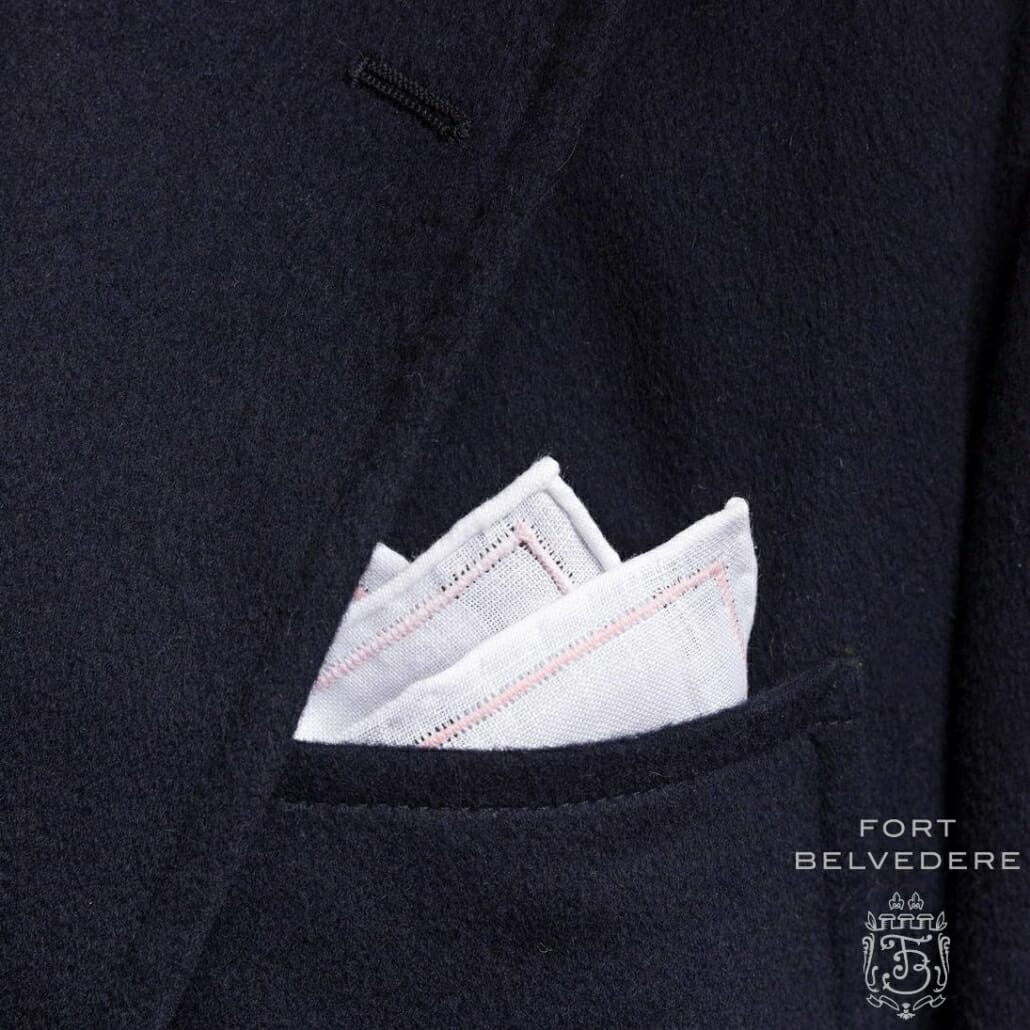
A white Irish linen pocket square with pink details from Fort Belvedere.
If you don’t want to go big to start, accessories are a great way to add pink to an outfit. The smallest dose can come in the form of a pocket square that contains a little of the color, either as a border along with several others in a paisley. A larger splash can be achieved with a pink boutonniere in your jacket lapel. There are a number of naturally pink flowers, including the most popular for buttonholes: carnations and roses.
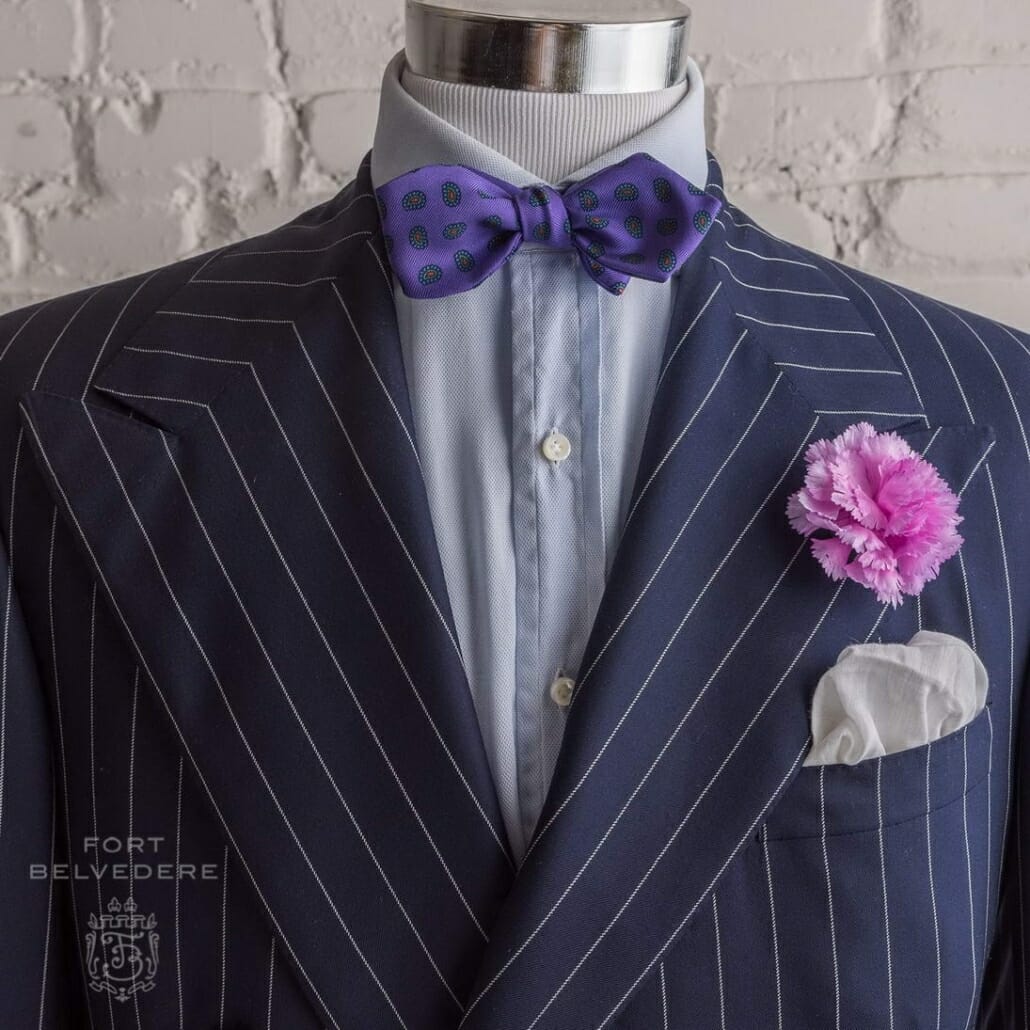
A pink carnation boutonniere from Fort Belvedere.
Around the same size, you can go with a pocket square that is mostly pink, perhaps with a white or cream border. Lastly, consider a pink tie, but avoid ones that are shiny. If you get a printed silk tie in pink, try one that contains other colors, maybe in the form of a geometric pattern or stripes. Solid pink linen or raw silk ties (shantung, tussah) are great for the summer because their texture and matte finish tame any potential gaudiness.
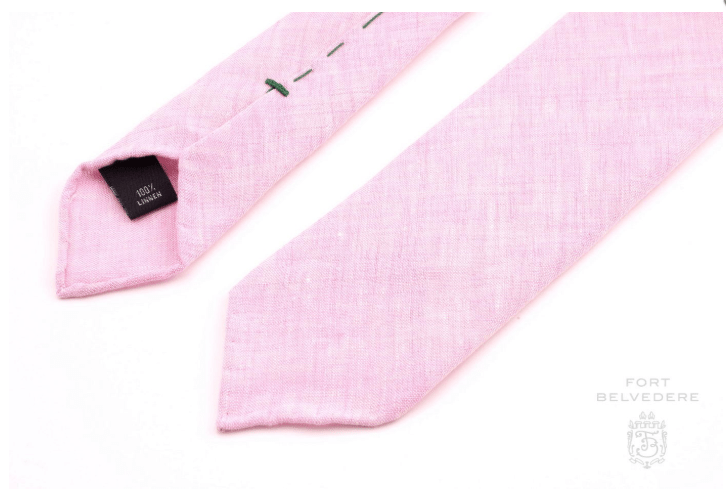
A textured light pink linen tie from Fort Belvedere
Pink Sport Coats and Suits
More daring than even the pink shirt is the pink sport coat, as it puts the color front and center as your top layer of clothing. This is definitely a summer look with a Neapolitan vibe, and something containing linen will likely be your fabric choice.
Riskiest of all is an entirely pink suit, which is exceedingly rare outside the confines of Pitt Uomo and remakes of the Great Gatsby. The most famous wearer is the fictional Jay Gatsby from F. Scott Fitzgrerald’s novel. In the book, the suit gets merely a passing reference. Gatsby’s rival, Tom Buchanan, is told that Gatsby is an Oxford man, to which he exclaims “Like hell he is! He wears a pink suit.” Again, the color is noted as being unconventional, a sign that Gatsby is “new money.” Despite occupying only a small space in the written text, the pink suit features strongly in both the Robert Redford and Leonardo DiCaprio film adaptations. Note how DiCaprio’s Gatsby is styled in the lightest possible shade of pink though with faded stripes. The overall impression is American, specifically Southern, rather than Italian, similar to the effect of wearing a red and white striped seersucker suit.
Pink Socks
While we at the Gentleman’s Gazette are not fans of crazy socks, you can certainly add a dash of personality and color to an outfit with pink and gray shadow stripe socks from Fort Belvedere, which remain conservative enough for work. The inclusion of gray striping suggests an essential pairing of these socks with any suit from light gray to charcoal.
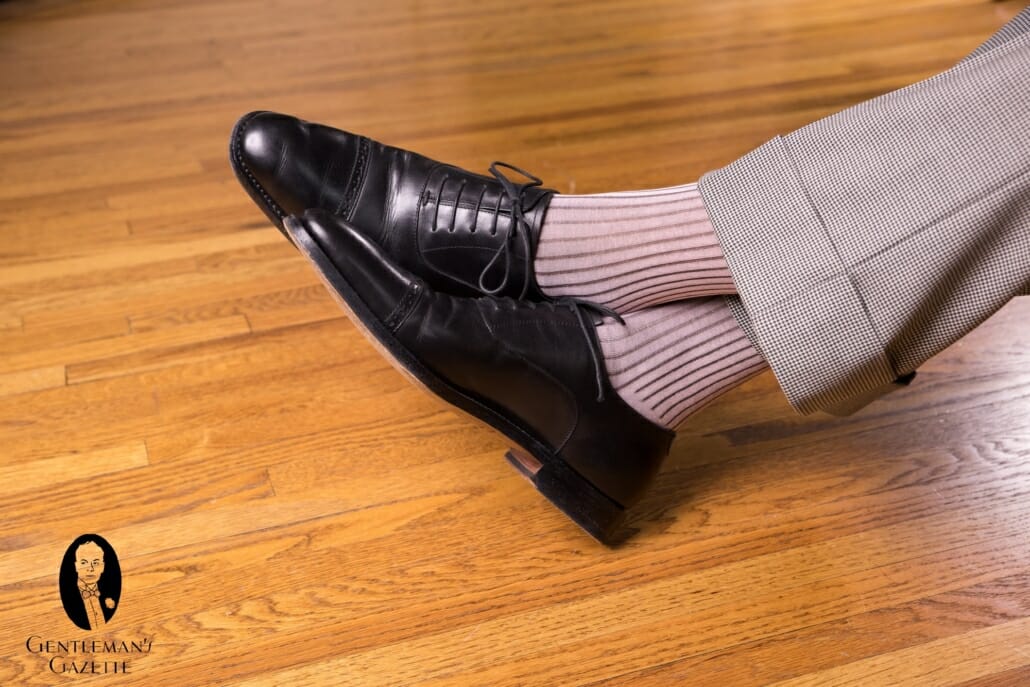
Pink and gray shadow-stripe socks from Fort Belvedere
As far as pink suede shoes or sneakers go, give them a wide berth. They’re just too fashion oriented and obviously showy. However, to casualize an otherwise tailored look, try replacing the brown or black laces on a pair of brogues with pink dress shoelaces as a very inexpensive way to perk things up.
Conclusion
As our society moves toward eliminating gender stereotypes, the possibilities for men of wearing pink have opened up and the color has gained traction in classic men’s style. Of course, many gents have long ignored the gender politics of pink and wear the color boldly. As with any new color, you can start small with pink accessories or dive in feet first with a pink shirt or jacket. Either way, you’ll discover how surprisingly well pink combines with other colors.
Do you wear pink as part of your traditional men’s style? What are your opinions on the color pink?
from Gentleman's Gazette https://ift.tt/2pKD6A3
- Get link
- X
- Other Apps
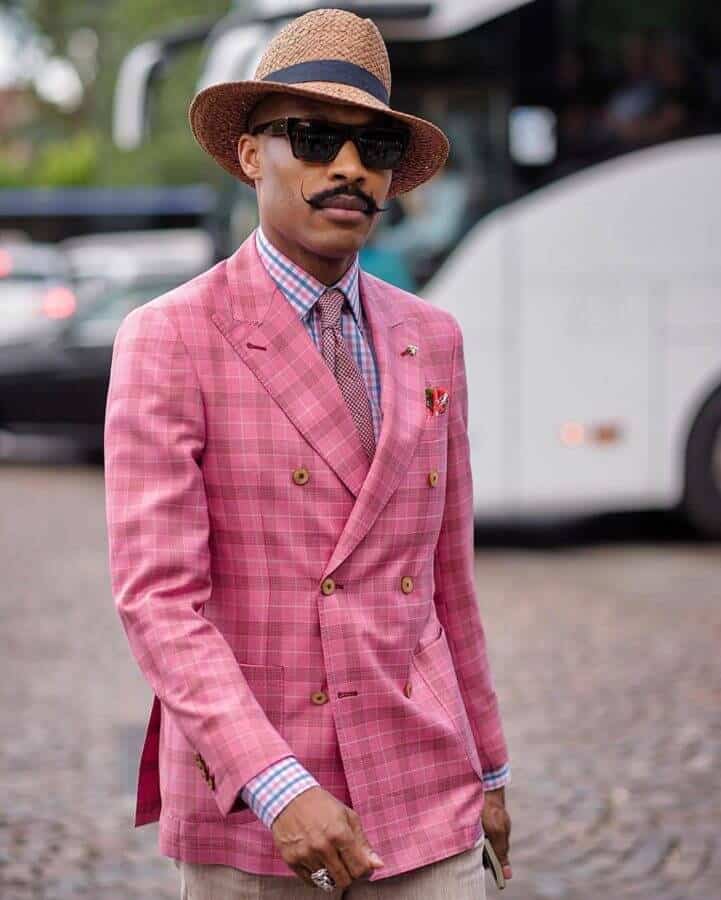

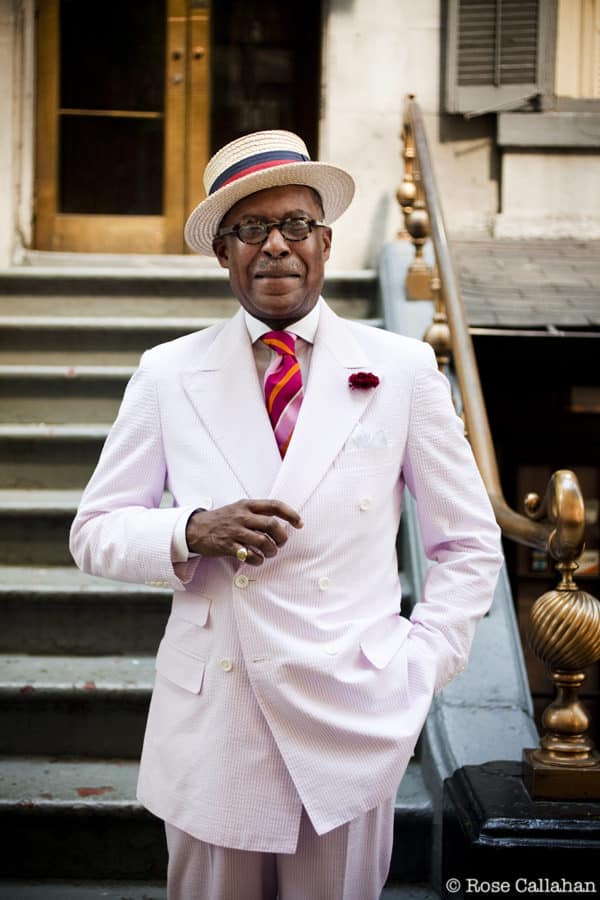
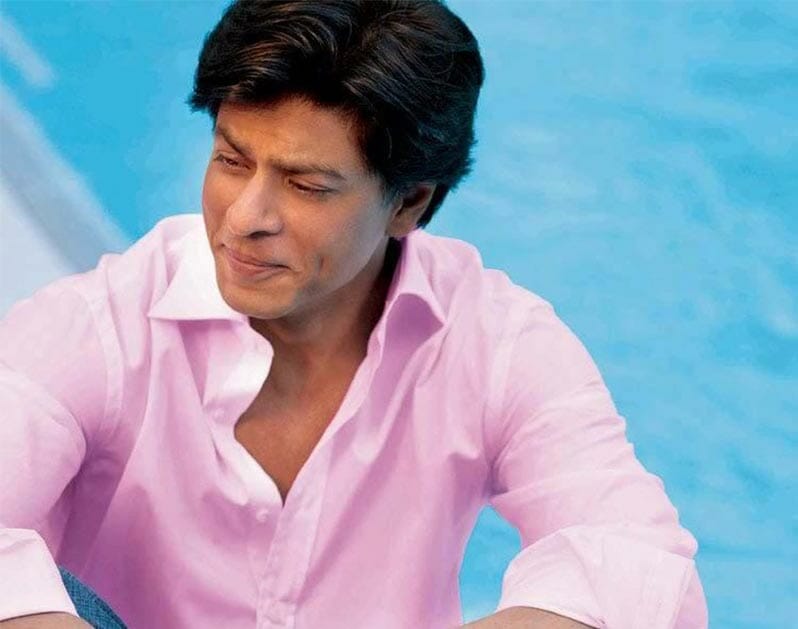
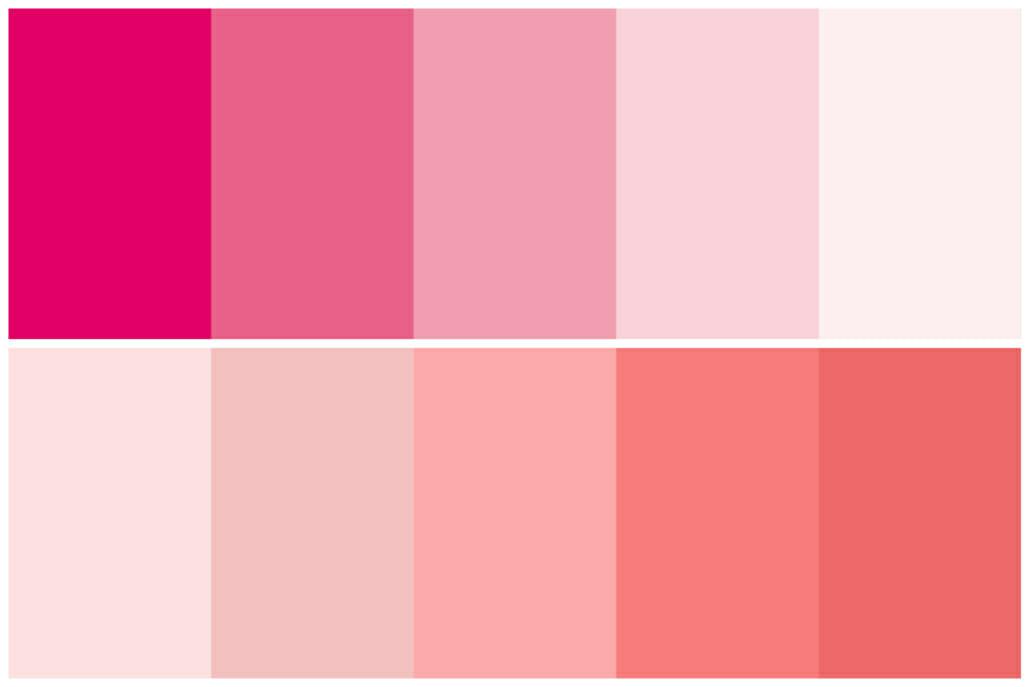

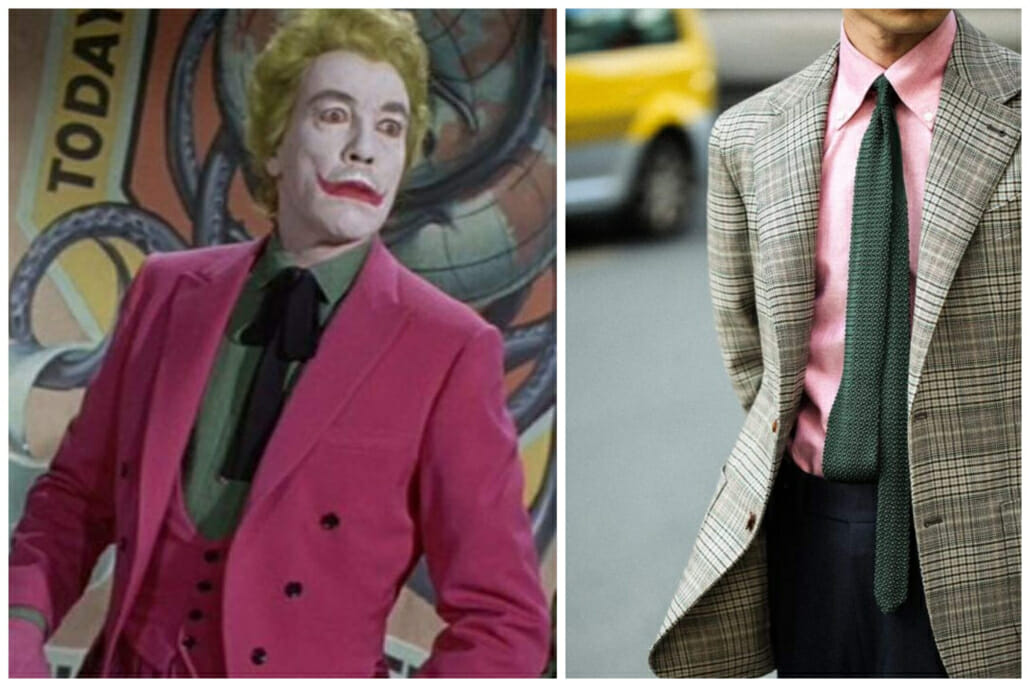
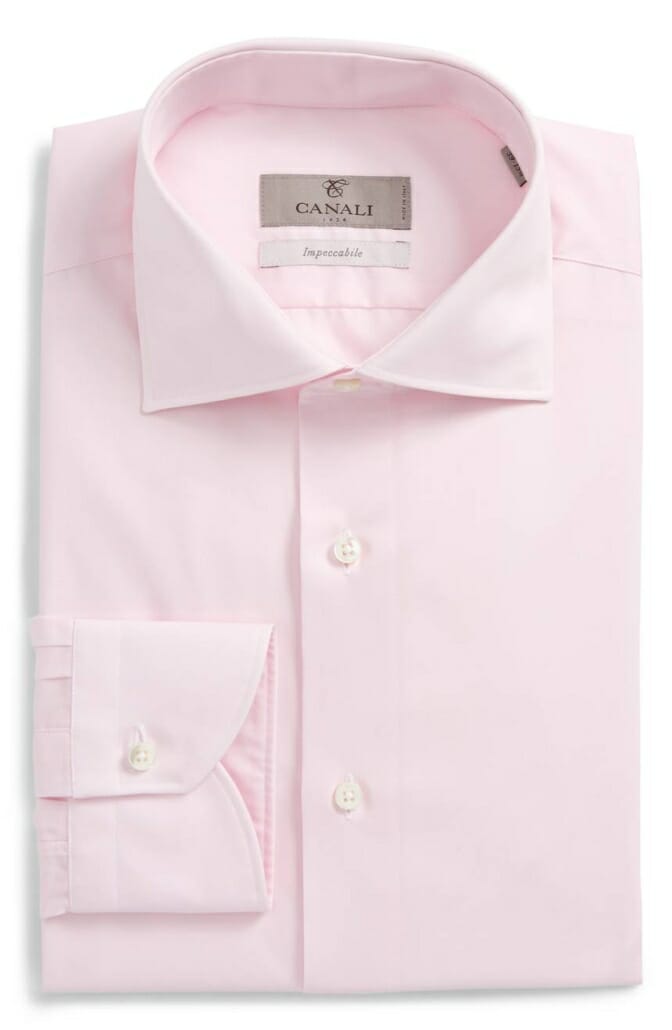
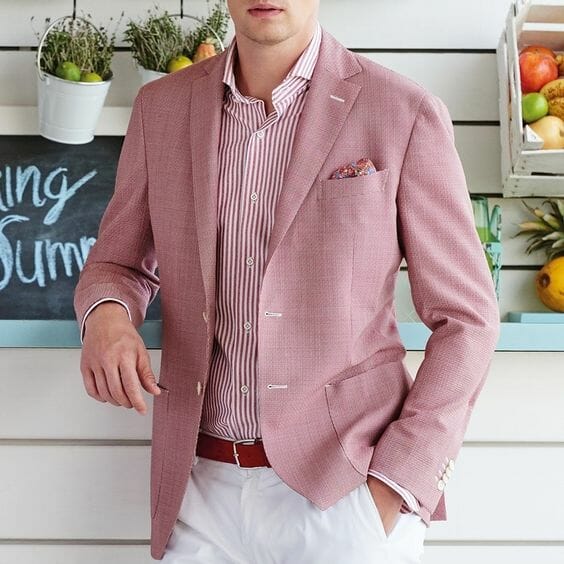

Comments
Post a Comment
thanks for your feedback